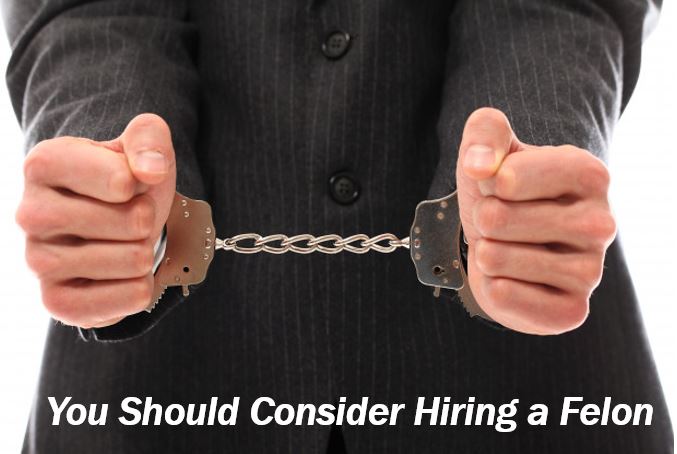Businesses may hesitate to hire a felon; however, there are more benefits to hiring an applicant with a criminal record than not. Due to his or her criminal history, the applicant might work harder than other employees.
There is a plethora of reasons why a person may face a felony charge. With the stigma that follows such a charge, a highly qualified employee may be overlooked during the hiring process. This makes it difficult for felons to move forward and work toward a sustainable life.

Criminal Convictions Aren’t Demonstrative of an Applicant’s Behavior.
Finding a job after a felony conviction is difficult. Felonies carry significant social prejudice because of the implication of violence or serious crimes, such as armed robbery. However, many crimes are classified as felonies that don’t involve violence or weapons, leaving nonviolent offenders with a harsh stigma.
For example, stealing mail is classified as a felony. Further, the circumstances of the crime could be out of proportion to the events during the crime. For example, a teenager could be shoplifting lipstick. As she runs out of the store, she runs into the loss prevention officer (LPO), which elevates her crime from petty larceny to battery on a security guard.
Moreover, many people commit crimes for economic reasons. They may commit crimes to feed their family, for instance. While applicants who are convicted because they are greedy may need to be excluded from consideration – especially if the job involves handling funds – applicants who were motivated to protect their family or business may deserve a second chance.
For example, over the past year and during the 2008 recession, many businesses experienced extreme stress. Restaurants, offices, bars, and many more businesses closed their doors permanently. Part of the economic support offered by the government were Small Business Administration loans.
These loans require applicants to swear under penalty of perjury dozens of statements regarding the use and accounting of the money. Many business owners signed these statements and then misused the funds resulting in felony convictions for making a false statement. Sometimes the misuse was a fraudulent application. But many convictions were by people who used the funds up too quickly and were unable to repay the loans simply because they were struggling financially.
Applicants with Criminal Histories Face Discrimination
It is unlawful for employers to discriminate against applicants with a criminal history. According to the Equal Employment Opportunity Commission guidelines, employers cannot ask about convictions for job applications unless the inquiry is related to crimes that are related to the job. Employers are also required to consider the totality of the circumstances of the arrest and conviction. Things they might consider include:
- Was the applicant afforded effectivecriminal defense?
- Were they a secondary or primary offender in the conviction?
- Has the applicant committed other crimes?
- What were the circumstances of the crime?
- How does the conviction relate to the job posting (if at all)?
Employers are at risk of a discrimination lawsuit if they refuse to hire someone because of a criminal conviction unrelated to the job posting.
Benefits of Hiring Someone with a Criminal Record
The National Hire Ex-Felons campaign is an organization that advocates on behalf of ex-felons and educates employers on the benefits of hiring ex-felons. The Department of Labor offers tax breaks to employers that hire people with criminal records through the Work Opportunity Tax Credit Program. The credit applies to any company that hires someone within a year after their conviction or release from prison.
Moreover, most felons are required as part of their probation to secure a job. Failure to meet these requirements could place them back into prison or cause additional restrictions to be imposed. People with criminal convictions are often grateful to employers who give them a chance. Further, felons on probation are required to check in with their probation officer, submit to drug tests, and are usually restricted in several other ways – such as consuming alcohol. The probation officer is an additional check on the employee’s behavior.
Few companies are willing to hire felons; therefore, the companies can select the very best among the candidates. The parole officer is also a good source to recruit additional workers. The company can provide information to the parole officer and request candidates with those qualifications or attributes. Also, felons must maintain employment as part of their release, so turnover is typically lower than among other employees.
At any point in time, approximately three million people are incarcerated in some way by local, state, and federal authorities. An additional three to four million people are on probation or parole. In major cities, there are far more people with criminal histories than employers realize. Refusing to hire felons forecloses a significant source of labor.
Furthermore, employers concerned about theft by a felon can obtain free insurance from the federal government—the fidelity bonds from employers from harm due to a felon’s dishonesty or theft.

